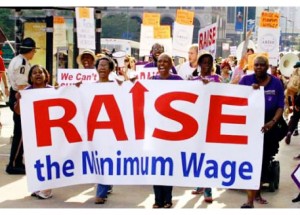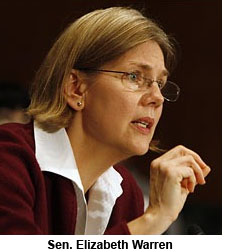NEWS ROUNDUP
Boeing layoffs, KING 5 union busting, the Warren plan…
Monday, February 29, 2016
BOEING
 ► From Reuters — Exclusive: Boeing plans layoffs for airplane engineers — Boeing said on Friday that it is considering layoffs of airplane engineers, a plan that it said may cause it to reorganize or consolidate its engineering teams, according to an internal memo seen by Reuters. Boeing said in a memo to employees that the company is deciding whether to make voluntary layoffs available to those workers, according to the document. The company also said it does not intend to replace higher-level employees who leave, except in rare situations. The internal announcement comes two weeks after Ray Conner, chief executive of Boeing’s airplane business, warned employees that job cuts were necessary to “win in the market, fund our growth and operate as a healthy business.”
► From Reuters — Exclusive: Boeing plans layoffs for airplane engineers — Boeing said on Friday that it is considering layoffs of airplane engineers, a plan that it said may cause it to reorganize or consolidate its engineering teams, according to an internal memo seen by Reuters. Boeing said in a memo to employees that the company is deciding whether to make voluntary layoffs available to those workers, according to the document. The company also said it does not intend to replace higher-level employees who leave, except in rare situations. The internal announcement comes two weeks after Ray Conner, chief executive of Boeing’s airplane business, warned employees that job cuts were necessary to “win in the market, fund our growth and operate as a healthy business.”
ALSO at The Stand:
— Group of House Dems unveil corporate tax accountability plan (Feb. 19)
— Strong voter support, Boeing job cuts stir renewed interest in bill (Feb. 12)
STATE GOVERNMENT
► In the Seattle Times — GOP-led Senate approves budget that Democrats say does too little — The Republican-led Washington Senate rejected 19 amendments offered by Democrats. The chamber eventually voted 25-22 in favor of adding about $34 million to the two-year, $38 billion operating budget adopted last year.
► In the Peninsula Daily News — Legislature to start supplemental budget negotiations this week — With both chambers of the state Legislature having passed supplemental budgets, negotiations will begin this week to hash out a version acceptable to both the Senate and House.
 ► From Geekwire — Tech leaders support move to let workers openly discuss their pay, in push for gender equity — Washington state’s Equal Pay Act dates to the 1940s, requiring men and women to receive the same pay for the same work. More than seven decades later, a bill up for discussion in the Legislature last week aimed to ensure that equitable pay actually happens by requiring employers to allow employees to openly discuss their compensation with their colleagues if they wish to do so.
► From Geekwire — Tech leaders support move to let workers openly discuss their pay, in push for gender equity — Washington state’s Equal Pay Act dates to the 1940s, requiring men and women to receive the same pay for the same work. More than seven decades later, a bill up for discussion in the Legislature last week aimed to ensure that equitable pay actually happens by requiring employers to allow employees to openly discuss their compensation with their colleagues if they wish to do so.
► From KUOW — Prescription drug sticker shock has Washington state looking for relief — The state spends about $1 billion per year on prescription drugs — that’s state and federal funds. And the cost has been going up. Now some state lawmakers are wondering if there’s a way to drive a better bargain. Or at least shed some new light on how drugs are priced.
► From KUOW — Washington puts Gov. Inslee’s carbon rules on hold — State regulators are setting aside the rules they’ve been working on to limit the amount of greenhouse gases that can be emitted into the air. The Department of Ecology was instructed by Gov. Jay Inslee to draw up the rules.
ELECTION 2016
 ► In the (Longview) Daily News — Voter initiative seeks to put price on carbon — “There’s nothing in I-732 that would compensate workers or communities who could end up losing jobs and tax revenue from, say, a mill in Cowlitz County moving,” said WSLC President Jeff Johnson. “You can’t do a big carbon policy without having some sort just transitional fund that help workers and their communities.”
► In the (Longview) Daily News — Voter initiative seeks to put price on carbon — “There’s nothing in I-732 that would compensate workers or communities who could end up losing jobs and tax revenue from, say, a mill in Cowlitz County moving,” said WSLC President Jeff Johnson. “You can’t do a big carbon policy without having some sort just transitional fund that help workers and their communities.”
ALSO at The Stand — WSLC opposes Initiative 732 carbon tax
► From KUOW — Hillary Clinton wins South Carolina in rout over Bernie Sanders — Hillary Clinton won the South Carolina Democratic primary on Saturday, notching a decisive win in a state where she suffered a devastating loss just eight years ago.
► In the NY Times — AFL-CIO prepares to create its own ‘Super PAC’ to get voters to the polls — The AFL-CIO, the federation of unions representing nearly 10 million workers, is preparing plans for a “super PAC” that would raise tens of millions of dollars and focus on grass-roots efforts to mobilize voters. Sources say the proposal calls for a separately funded entity that would raise money from unions, and potentially from progressive donors as well.
LOCAL
 ► From the MLKCLC — Stand up against union busting at KING 5 — Tegna, the company that bought KING5 and 23 other stations in 2013, is attempting to take jobs from union-represented workers and give them to non-union employees. This will lead to the end of the local news as we know it. Experienced broadcast journalists will be purged and replaced with rank amateurs. IBEW Local 46 and IATSE Local 600 have legislation before the King County Council calling for an investigation of the community impacts of the Tegna business model. Come and speak out Tuesday, March 8 at 9:30 a.m. at the King County Council, 516 3rd Ave., 10th floor, Seattle. Let the councilmembers know that KING5 is a community asset not a cash cow for Wall Street speculators.
► From the MLKCLC — Stand up against union busting at KING 5 — Tegna, the company that bought KING5 and 23 other stations in 2013, is attempting to take jobs from union-represented workers and give them to non-union employees. This will lead to the end of the local news as we know it. Experienced broadcast journalists will be purged and replaced with rank amateurs. IBEW Local 46 and IATSE Local 600 have legislation before the King County Council calling for an investigation of the community impacts of the Tegna business model. Come and speak out Tuesday, March 8 at 9:30 a.m. at the King County Council, 516 3rd Ave., 10th floor, Seattle. Let the councilmembers know that KING5 is a community asset not a cash cow for Wall Street speculators.
► From UnivisionSeattle — En Favor de la Liberación de Nestora Salgado — El polémico caso que seguimos paso a paso de la Mujer del área de Renton presa en México, Nestora Salgado. Nuestro compañero José Luis Gonzalez nos trae el reporte actualizado de este caso. (Includes interview with Rep. Adam Smith calling for Nestora’s release.)
ALSO at The Stand — Seattle City Council joins chorus urging Mexico to free Nestora
TRANS-PACIFIC PARTNERSHIP
► From Politico — Labor seeks revenge on free-trade Dems — Labor’s fight against the White House’ free-trade agenda is moving into the trenches in tight Democratic races, with many of the 28 moderates who supported “fast-track” trade promotion legislation now targeted for that and their likely support for the TPP… Meanwhile, the White House and trade-friendly lawmakers hope to grow support for the TPP among the two dozen Democrats who voted against fast track, including Denny Heck and Adam Smith of Washington.
 ► From The Hill — Business groups form powerhouse coalition to lobby for TPP — Five of the nation’s most powerful business groups said they are teaming up to rally support behind an expansive Pacific Rim trade agreement.
► From The Hill — Business groups form powerhouse coalition to lobby for TPP — Five of the nation’s most powerful business groups said they are teaming up to rally support behind an expansive Pacific Rim trade agreement.
► In the News Tribune — TPP isn’t a good deal for the U.S. (letter) — Perhaps (the TPP) would increase corporate profits. But here are just a few examples of other consequences. Outsourcing of jobs would increase. (Remember NAFTA? It was supposed to increase jobs, too.) Access to generic medications would be further delayed, making life-saving treatments not affordable to many. Corporations would be able to sue for loss of expected profits, such as from passage of regulations to protect the environment or limit climate change… Economist Robert Reich says, “The TPP is a Trojan horse in a global race to the bottom.” I agree.
FEDERAL GOVERNMENT
 ► From the Fiscal Times — As roads crumble, infrastructure spending hits a 30-year low — Last December, Congress finally pushed through a $305 billion, five-year highway and transit bill after years of delay and neglect of the nation’s roads and infrastructure. However, despite the celebration by lawmakers and state and local officials who have long sought the increased spending, the legislation was little more than a drop in the bucket when compared to the nation’s overall infrastructure needs.
► From the Fiscal Times — As roads crumble, infrastructure spending hits a 30-year low — Last December, Congress finally pushed through a $305 billion, five-year highway and transit bill after years of delay and neglect of the nation’s roads and infrastructure. However, despite the celebration by lawmakers and state and local officials who have long sought the increased spending, the legislation was little more than a drop in the bucket when compared to the nation’s overall infrastructure needs.
► From TPM — The unlikely GOP senator in the middle of the SCOTUS tug of war — Sen. Chuck Grassley, the 82-year-old Iowa farmer known for his typo-riddled tweets, homespun style, annual 99-county tours of Iowa, and a decades-long career in Washington, has little experience in being the focal point of a Capitol Hill political showdown in the national spotlight, but here he is thrust into history over the future of the Supreme Court.
ALSO at The Stand — Tell Senate GOP: Do your job, work to fill the vacancy
► In the Seattle Times — The strong arm of constitutional law should prevail in Supreme Court nomination (by four former U.S. attorneys) — The president is elected for a four-year term under Article II of the Constitution. There is no clause or amendment diminishing the president’s duties or powers in the last year.
NATIONAL
 ► In Sunday’s Washington Post — No, raising the local minimum wage doesn’t hurt local businesses (by Jared Bernstein and Ben Speilberg) — This variation (of state and city minimum wages) has provided opportunities for something rare in empirical economics: quasi-experimental studies. In one, economists Alan Krueger and David Card compared fast-food employment in New Jersey, which raised its minimum wage in 1992, with that in Pennsylvania, which did not. “We find no indication that the rise in the minimum wage reduced employment,” they concluded. Are sub-state localities different from states? Another important study gets at this question by looking at county-level data, comparing every contiguous county across state borders where minimum wages differed over the course of 16 years. The researchers found “no evidence of job losses for high impact sectors such as restaurants and retail.”
► In Sunday’s Washington Post — No, raising the local minimum wage doesn’t hurt local businesses (by Jared Bernstein and Ben Speilberg) — This variation (of state and city minimum wages) has provided opportunities for something rare in empirical economics: quasi-experimental studies. In one, economists Alan Krueger and David Card compared fast-food employment in New Jersey, which raised its minimum wage in 1992, with that in Pennsylvania, which did not. “We find no indication that the rise in the minimum wage reduced employment,” they concluded. Are sub-state localities different from states? Another important study gets at this question by looking at county-level data, comparing every contiguous county across state borders where minimum wages differed over the course of 16 years. The researchers found “no evidence of job losses for high impact sectors such as restaurants and retail.”
► From AFL-CIO Now — AFL-CIO Executive Council takes on the retirement crisis, Flint, the Zika Virus and other important issues — At their meeting last week, the AFL-CIO Executive Council issued a variety of policy statements on important issues. Take a look at those policy statements.
► In today’s NY Times — With fewer members, a diminished political role for Wisconsin unions — Wisconsin, once a labor stronghold, has lost tens of thousands of union members, and the shift has shaken the order of election-year politics.
TODAY’S MUST-READ
 ► In the Boston Globe — How to level the playing field for working families (by Sen. Elizabeth Warren) — First, raise wages. No one who works full-time should live in poverty — and that starts with raising the minimum wage to $15 an hour. It also means passing equal-pay laws. The gender pay gap can add up to hundreds of thousands of dollars in additional wages over a lifetime of work for women doing the same jobs as their male colleagues. It means protecting workers’ right to organize… Second, provide some additional insurance for workers so that taking a little time off to care for a newborn or a loved one doesn’t spell financial ruin — and that includes paid family and medical leave and paid sick days… Third, establish some basic rules of the road for work schedules… Fourth, enforce the labor laws we already have on the books… Finally, after a lifetime of hard work, retirement with dignity should be guaranteed to every American. This means expanding and protecting Social Security.
► In the Boston Globe — How to level the playing field for working families (by Sen. Elizabeth Warren) — First, raise wages. No one who works full-time should live in poverty — and that starts with raising the minimum wage to $15 an hour. It also means passing equal-pay laws. The gender pay gap can add up to hundreds of thousands of dollars in additional wages over a lifetime of work for women doing the same jobs as their male colleagues. It means protecting workers’ right to organize… Second, provide some additional insurance for workers so that taking a little time off to care for a newborn or a loved one doesn’t spell financial ruin — and that includes paid family and medical leave and paid sick days… Third, establish some basic rules of the road for work schedules… Fourth, enforce the labor laws we already have on the books… Finally, after a lifetime of hard work, retirement with dignity should be guaranteed to every American. This means expanding and protecting Social Security.
The Stand posts links to Washington state and national news of interest every weekday morning by 10 a.m.





